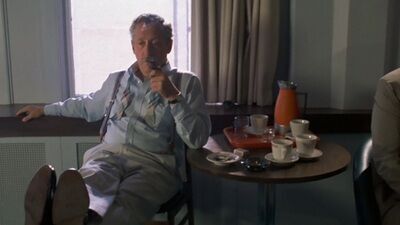He was born Myron G. Nussbaum on December 29, 1923 and grew up in the Albany Park section of Chicago’s Northwest Side. He served in the armed forces during World War II at the Allied Expeditionary Force under the command of Gen. Dwight D. Eisenhower and in that capacity became the one charged with cabling the news of Germany’s surrender in Paris in 1945, even appending his name to the document along with Eisenhower’s. After returning home, he got married in 1949 to his first wife, Annette, and spent the next 20 years working alongside his brother-in-law in a local extermination business.
In the Sixties, Nussbaum began his acting career as a member of Hull House, the first community theater in the United States, at the time when it was beginning to flourish under the direction of Robert Sickinger, eventually going on to influence the entire emerging Chicago theater scene. By the time the Seventies arrived, he had earned his Equity card and became a fixture on local stages, appearing in productions of such works as The Deer Park, Native Son, Death of a Salesman, Little Murders, Romeo and Juliet, Richard II, The Rose Tattoo, Tuesdays with Morris, The Dresser, 1984, Henry IV Parts 1 & 2, Hamlet, Broadway Bound, Freud’s Last Session and The Old Country at such locations as the Goodman Theatre, Steppenwolf and the Chicago Shakespeare Theater. He also directed a number of plays, including the national premiere on Broadway of Do Black Patent Leather Shoes Really Reflect Up in 1982 and his own play, Dashiell Hamlet, in 2008. This run of work earned him 16 Joseph Jefferson award nominations for both acting and directing, winning four for acting, one for directing and a career achievement award.
His most notable collaboration over the years would be his work with David Mamet, whom he met at Second City in the 1970s. Over the years, Nussbaum would appear in a number of Mamet’s plays, even originating roles in two of the author’s most notable works—he was the first to play Teach in American Buffalo and then went on to portray George Aaronow in the Pulitzer Prize-winning Glengarry Glen Ross in 1984, first in Chicago and then as part of the first Broadway cast. In many ways, Nussbaum was the ideal embodiment of the kind of characters that Mamet was writing at the time—ordinary men doing what they had to do to get by in a harsh world who were nevertheless capable of extraordinary eloquence—and he had the ability to deliver Mamet’s often-stylized dialogue in a way that made it sound absolutely natural.

